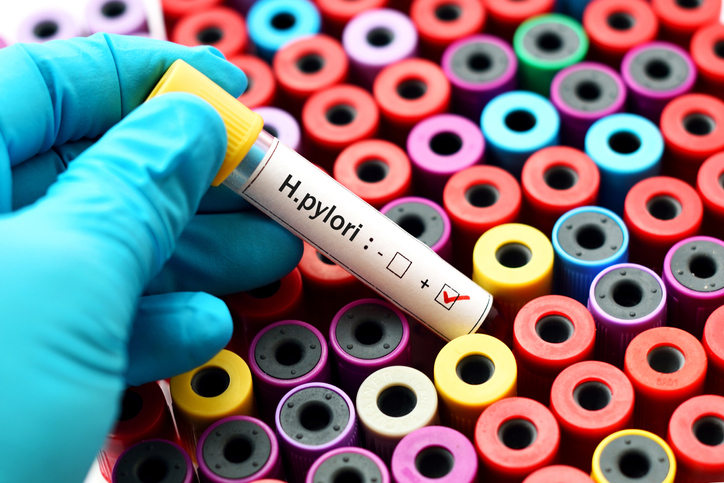PUBLICIDAD
Helicobacter pylori: The Bacteria That Can Give You an Ulcer
0If the peptic ulcers or stomach pain and discomfort lasts longer than one month, the doctor will do tests for <i>H. pylori</i>.
Publicidad
https://hdstatic.net/gridfs/holadoctor/5c5af22113e884262a12e98f_0_24-1626822242,674.jpg
<i>Helicobacter pylori</i> bacteria is the main cause of gastric ulcers and many cases of chronic gastritis, which is characterized by a burning sensation while eating. Although most cases do not cause any problems, this threat is very common, affecting approximately two-thirds of the global population.
https://hdstatic.net/gridfs/holadoctor/5c5af22113e884262a12e98f_1_16-1655393576,468.jpg
<p><i>H. pylori</i> enters the stomach and sticks to its surface, causing increased production of stomach acid, bleeding, infections, and poor digestion. The stomach walls become damaged and wounds called ulcers are formed. It can also develop into chronic inflammation (gastritis) and, in some cases, stomach cancer. <br></p>
https://hdstatic.net/gridfs/holadoctor/5c5af22113e884262a12e98f_11_3-1549466070,201.jpg
<p>Although it is unclear, in most cases <i>H. pylori</i> is transmitted from person to person, usually during childhood. People can also get infected from contact with the mouth or stool or contaminated food and water. If the infection is not treated, it can become chronic.<br></p>
https://hdstatic.net/gridfs/holadoctor/5c5af22113e884262a12e98f_10_22-1549466053,243.jpg
The risk factors for <i>H. pylori</i> infection are primarily related to childhood living conditions, such as living with many people without a safe source of water, in unhealthy areas, or with someone who has already been infected.
https://hdstatic.net/gridfs/holadoctor/5c5af22113e884262a12e98f_4_12-1655393576,505.jpg
How to identify it
<p>H. pylori usually causes a feeling of hunger and empty stomach approximately 1 to 3 hours after eating. It can also cause problems drinking fluids, loss of appetite, involuntary weight loss, vomiting, and dark or bloody stool. <br></p>
https://hdstatic.net/gridfs/holadoctor/5c5af22113e884262a12e98f_10_2-1549464894,358.jpg
Between 10 and 15% of people infected with <i>H. pylori</i> develop peptic ulcer disease, in which stomach acid damages the lining of the digestive tract.
https://hdstatic.net/gridfs/holadoctor/5c5af22113e884262a12e98f_4_31-1549464358,627.jpg
If the peptic ulcers or stomach pain and discomfort lasts longer than one month, the doctor will do tests for <i>H. pylori</i>.
https://hdstatic.net/gridfs/holadoctor/5c5af22113e884262a12e98f_2_42-1549464202,276.jpg
How to prevent it
<p>To prevent <i>H. pylori</i> infection, specialists recommend washing your hands well after using the bathroom and before eating. It is also important to drink water from safe sources and to prepare food properly.<br></p>
https://hdstatic.net/gridfs/holadoctor/5c5af22113e884262a12e98f_5_41-1549464381,595.jpg
Treatment
<p>If detected, <i>H. pylori</i> infection is curable, although these bacteria are very resistant. Eliminating it requires a two-week treatment regimen with antibiotics and a medication that reduces the secretion of stomach acid. This treatment is the best way to get rid of the bacteria and prevent future ulcers. <br></p>
https://hdstatic.net/gridfs/holadoctor/5c5af22113e884262a12e98f_6_28-1549464466,795.jpg
Beneficial foods
<p>Some foods can help combat <i>H. pylori</i> during treatment, although they cannot replace the treatment. These include foods with anti-inflammatory properties, low-acid foods, and quickly digestible foods. For example: cooked fruits and vegetables (broccoli, cabbage, raspberries, blackberries, blueberries, pears, apples, and bananas), white meat and fish, yogurt, nuts, seeds, and olive oil. <br></p>
https://hdstatic.net/gridfs/holadoctor/5c5af22113e884262a12e98f_7_21-1549464694,142.jpg
What to avoid
<p>You can also help your body fight <i>H. pylori</i> by avoiding certain foods, primarily those that irritate the stomach, increase stomach acid production, or take a long time to digest. These include sodas, alcoholic beverages, pepper and spices, red or processed meats, coffee, chocolate, and yellow cheese. <br></p>
https://hdstatic.net/gridfs/holadoctor/5c5af22113e884262a12e98f_8_32-1549464744,648.jpg
Sources:
<p>Natural Medicines Comprehensive Database; National Library of Medicine; Mayo Clinic.</p>
/en/photo-album/helicobacter-pylori-the-bacteria-that-can-give-you-an-ulcer
/en/photo-album/helicobacter-pylori-the-bacteria-that-can-give-you-an-ulcer-
/en/photo-album/helicobacter-pylori-the-bacteria-that-can-give-you-an-ulcer-
/en/photo-album/helicobacter-pylori-the-bacteria-that-can-give-you-an-ulcer-
/en/photo-album/helicobacter-pylori-the-bacteria-that-can-give-you-an-ulcer-how-to-identify-it
/en/photo-album/helicobacter-pylori-the-bacteria-that-can-give-you-an-ulcer-
/en/photo-album/helicobacter-pylori-the-bacteria-that-can-give-you-an-ulcer-
/en/photo-album/helicobacter-pylori-the-bacteria-that-can-give-you-an-ulcer-how-to-prevent-it
/en/photo-album/helicobacter-pylori-the-bacteria-that-can-give-you-an-ulcer-treatment
/en/photo-album/helicobacter-pylori-the-bacteria-that-can-give-you-an-ulcer-beneficial-foods
/en/photo-album/helicobacter-pylori-the-bacteria-that-can-give-you-an-ulcer-what-to-avoid
/en/photo-album/helicobacter-pylori-the-bacteria-that-can-give-you-an-ulcer-sources













